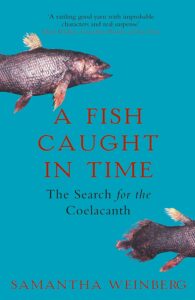
A Fish Caught in Time: The Search for the Coelacanth
by Samantha Weinberg
Genres: History, Non-fiction, SciencePages: 256
Rating:

Synopsis:A gripping story of obsession, adventure and the search for our oldest surviving ancestor - 400 million years old - a four-limbed dinofish
In 1938, Marjorie Courtenay-Latimer, a young South African museum curator, caught sight of a specimen among a fisherman's trawl that she knew was special. With limb-like protuberances culminating in fins the strange fish was unlike anything she had ever seen. The museum board members dismissed it as a common lungfish, but when Marjorie eventually contacted Professor JLB Smith, he immediately identified her fish as a coelacanth - a species known to have lived 400 million years ago, and believed by many scientists to be the evolutionary missing link - the first creature to crawl out of the sea. Marjorie Courtenay-Latimer had thus made the century's greatest zoological discovery. But Smith needed a live or frozen specimen to verify the discovery, so began his search for another coelacanth, to which he devoted his life.
I didn’t really expect to be hooked when I picked up Samantha Weinberg’s A Fish Caught in Time. Fish aren’t a huge interest of mine, even coelacanths, and in many ways the book is quite biographical in detail, discussing the life of J.L.B. Smith and Margaret Smith in quite a bit of detail, along with some of the other personalities who searched for live coelacanths.
Nonetheless, I found it surprisingly riveting! And that’s always fun, when a book turns out to surprise you. And there are details about coelacanths too, and the controversies surrounding them (are they a missing link between the water and the land, for example? and do they bear live young, or not?), which the biographical details help to highlight and contextualise.
It also helps to make the political implications of coelacanths and their territories very clear; I hadn’t particularly thought about who might consider themselves to own coelacanths, and yet it’s very clear that various countries and localities and political bodies have tried.
If you’re looking for something that’s more of a deep dive into coelacanth biology and ecology, this wouldn’t be it — but it’s an interesting history of the moment the first recently-dead coelacanth was found, and what it meant, and what it led to.
Rating: 4/5

Leave a Reply